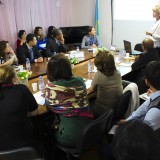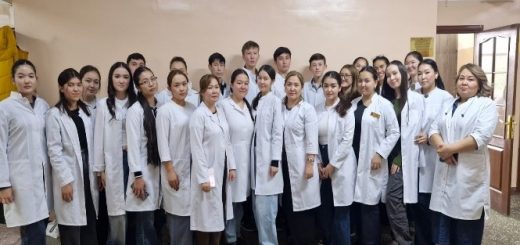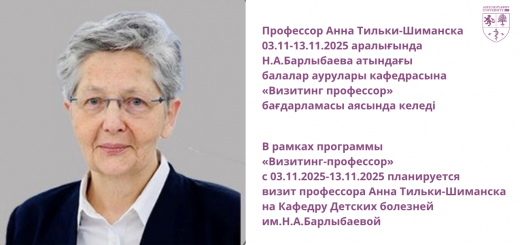ROUNDTABLE «Actual issues of hepatology»
ROUNDTABLE
«Actual issues of hepatology»
Inframesoftheannualinternational conference «UniversityDays 2015: 85 years for KazNMU: achievements and prospectives»,in December 4, 2015 in United University Clinic the employees of Hepatological Center n.a. Atsumasa Komori have carried out the roundtable «Actual issues of hepatology».
The following personshave participated theworkshop: director of the United University Clinic Z.Gubaidullina, Professor of Economics, Master of International Relations, Honorable Professor of KazNMUOrvill Adams(Canada), chief gastroenterologist, Associate of the Health Management of Almaty, chief of the department of internship and residency of internal medicine #3, B. Iskakov, MD, PhD, ScD, professor; head of the department of gastroenterology and hepatology of the National Research Center of Cardiology and Internal Diseases A. Nersesov, MD, PhD, ScD, professor; director of the TDID of KazNMUS. Sadykova, MD, PhD; head of the department of internal diseases #1G. Kurmanova, MD, PhD, ScD, professor; head of scientific clinical and diagnostic laboratory NRC n.a. B. AtchabarovD. Batyrbayeva, PhD; head of hepatological center of Almaty R. Zhusupova; associate professor of the department of inflectional diseases L. Deryabina, MD, PhD; tutors of the departments of inflectional and tropical diseases; internal medicine # 1, 2, 3; outpatient health care departments, intership of general medicine departments, srot medicine department, doctors of inflectional hospitals and outpatient hospitals of Almaty, interns of General Medicine.
During the presentations and discussions, it was pointedthat in recent years in the Republic of Kazakhstan has implemented a set of measures aimed at reducing the incidence of hepatitis, improving the quality and increasing the life expectancy of patients with liver disease. Carrying out preventive vaccination against hepatitis B in the National calendar led to a significant reduction in the incidence of acute forms of hepatitis B — in Almaty 4.2 times, in the Republic of Kazakhstan — 7.5 times. Since 2011 in the Republic of the State program, in which patients with viral hepatitis receiving antiviral therapy free of charge. Established and functioning regional Hepatology Center. In our country introduced a national screening program for the detection of primary liver cancer.
However, a number of outstanding issues on the organization of care for patients with liver disease remains actual. First of all, it is the lack of continuity at various stages of care, integrated multidisciplinary approach to patient management, insufficient use of modern methods of diagnosis and treatment of liver diseases.
The purpose of the roundtable is to determine the optimal model of care for patients with chronic liver disease.
Tasks:
–tointroduce modern methods of diagnosis and treatment of liver diseases;
–to demonstrate the possibility of using innovative methods of diagnosis and treatment of patients with liver disease Hepatology at the Center for Conjoint University Hospital of Asfendiyarov’s KazNMU;
– todemonstrate ways of cooperation with the Center for Hematology medical institutions of Almaty for medical care to patients with liver disease;
— to present a model of care for patients with liver disease Hepatology at the Conjoint University Hospital of Asfendiyarov’s KazNMU;
The recommendations provided as a result of the roundtable:
- Inspection, monitoring and treatment of patients with liver disease are carried out using modern methods on the basis of diagnosis and treatment protocols of MH and SD RK.
- In the management of patients with liver disease integrated approach through the interaction of the infectious units, gastroenterology, surgery and cancer care.
- To improve the competence of doctors to conduct a training courses on hepatologicalissues at the Centre of Hepatology of Conjoint University Hospital, Asfendiyarov’s KazNMU.
- To organize the work of the Center for Hematology according to the representation of the model of care for patients with liver disease.





















